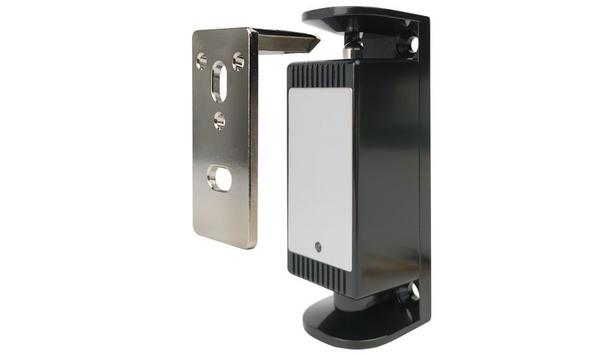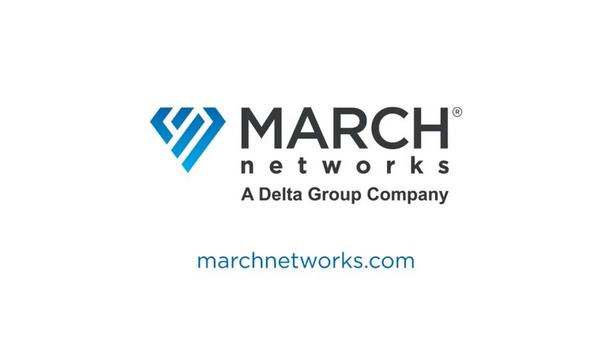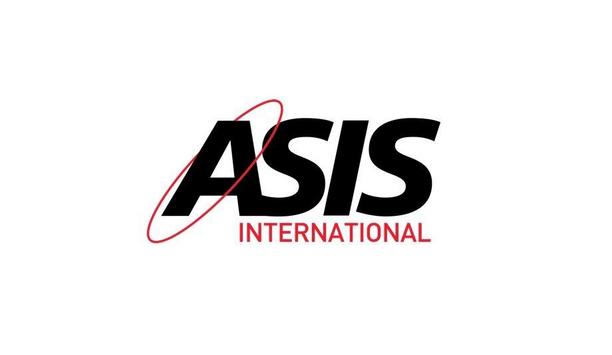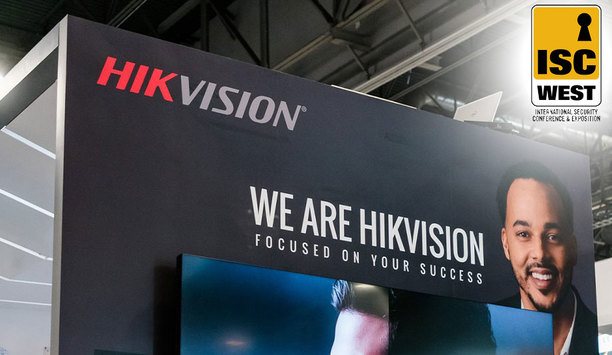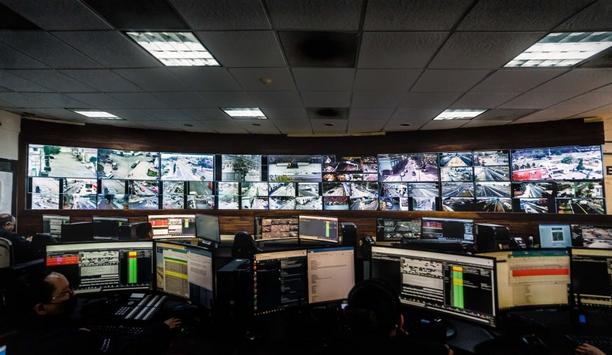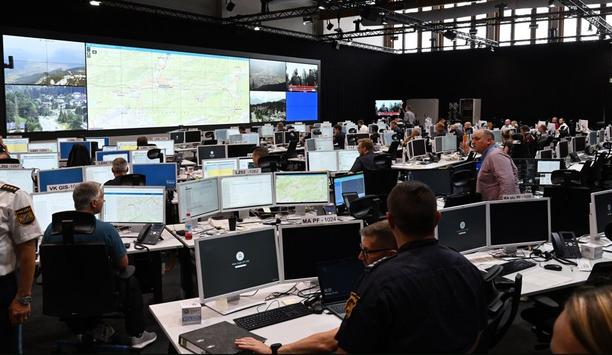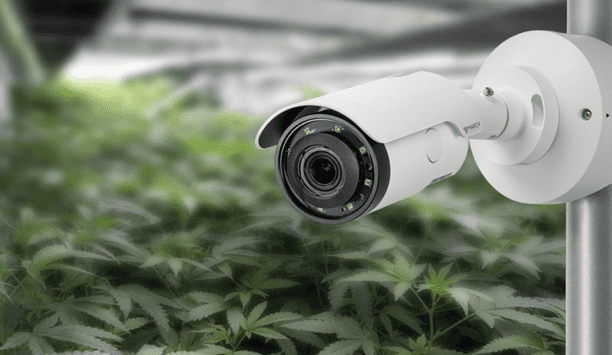Cannabis and Security
News
Camden Door Controls is pleased to introduce to the market the CX-ED0010 Electromechanical Cabinet Lock. Representative of the impressive technological evolution in secure locking systems, it is designed for a variety of enclosures that use swinging doors, drawers, and sliding doors. This lock introduces the flexibility of operating in either field selectable fail-safe or fail-secure modes and supports both 12V and 24V power supplies. Functionality of the CX-ED0010 This flexible and affordable cabinet lock is ideal for a wide range of access control applications, including securing computer cabinets, lockers, retail display counters, and medical and cannabis dispensaries. It features front mounting for use with office drawers, display cabinets, etc. and the strike plate easily adjusts to door alignment. Door and lock status sensors provide real-time security status, further enhancing the functionality of the CX-ED0010.
March Networks is excited to share their new corporate video, a compelling showcase of how they’re pioneering the future of intelligent video solutions. With a focus on pragmatic innovation, their video highlights the transformative impact of their technology on businesses worldwide. video-based business intelligence In an ever-evolving business landscape, the need for advanced, cost-effective solutions to safeguard assets, enhance operational efficiencies, and boost profitability has never been more critical. Their newly released video articulates March Networks’ commitment to meeting these needs through their cutting-edge intelligent video solutions. From the outset, March Networks has been at the forefront of the digital surveillance industry From the outset, March Networks has been at the forefront of the digital surveillance industry, serving clients across over 70 countries with state-of-the-art software, cloud solutions, and video-based business insights. Their technology drives innovation, transforming traditional surveillance into a comprehensive operational tool that empowers businesses to achieve unparalleled efficiency. Insights from President and CEO, Peter Strom Peter Strom, a visionary leader in the industry, emphasizes the richness of data captured through video surveillance, stating, “There’s no area that’s richer in data than video surveillance. We capture so much information on a daily basis, making it a day-to-day operational tool that many people inside a corporation, or stakeholders, can use to make their operation a lot more efficient.” Tailored Solutions for Diverse Industries March Networks’ approach involves crafting customized solutions that integrate video with AI analytics. This synergy provides valuable business insights, enabling informed decisions to optimize efficiency, reduce loss, enhance growth opportunities, and improve customer experiences. With their technology, businesses receive automated, real-time alerts, ensuring the protection of what’s most important. Their expertise extends across numerous industry verticals, ensuring operational efficiency, loss prevention, and enhanced security: Retail: For the retail industry, March Networks offers advanced video surveillance and analytics solutions aimed at reducing shrinkage and improving store operations. Their tools enable retailers to analyze customer traffic patterns, optimize store layouts, and improve the shopping experience, all while ensuring the safety and security of staff and customers. Banking: In the financial sector, security and compliance are paramount. March Networks’ intelligent video solutions offer fraud prevention, ATM skimming detection, and ensure compliance with industry regulations. Their systems not only protect against external threats, but also offer insights into customer behavior, aiding in the development of strategies to enhance customer service and operational efficiency. Transportation: For transportation networks, including public transit and logistics companies, March Networks ensures the safety of passengers and goods with high-quality video surveillance. With strategic integration into third-party systems, their solutions monitor and manage everything from traffic flow to incident response, helping to minimize delays and optimize operations. Restaurants In the restaurant industry, March Networks helps business owners enhance customer service, improve operational efficiency, and reduce losses due to theft or fraud. Their intelligent video solutions offer insights into customer behavior, staff performance, and inventory management, creating opportunities for business growth and improved customer experiences. Commercial/Industrial: For commercial and industrial environments, March Networks provides cutting-edge video surveillance and analytics solutions that enhance security, monitor operations, and improve safety. Their technologies enable businesses to oversee production processes, manage logistics, and ensure the safety of employees and assets in challenging and dynamic environments. Education: In educational institutions, ensuring the safety of students and staff is a top priority. March Networks provides robust video surveillance solutions designed to support incident response and crisis management, enhancing security on campuses while respecting privacy and compliance standards. Healthcare: In healthcare facilities, security systems must be sensitive to the privacy and safety of patients, staff, and visitors. March Networks offers solutions that aid in monitoring sensitive areas, managing access control, and ensuring compliance with healthcare regulations, all while prioritising the well-being of patients. Cannabis: For the rapidly growing cannabis industry, security and regulatory compliance are key challenges. March Networks delivers comprehensive video surveillance and analytics solutions that help cannabis businesses protect their assets, ensure compliance with strict regulations, and optimize their operations for increased profitability and safety. A Trusted Partner in Securing Ytheir Business “We are going to lead this market by focusing on developing unique solutions that solve unique problems for their customers,” asserts Peter Strom. March Networks is dedicated to being more than just a surveillance provider; they are a partner in securing business and delivering valuable intelligence across multiple departments – dedicated to solving the unique challenges faced by their customers. March Networks continues to lead the way in intelligent video solutions In embodying their core values of innovation, reliability, and partnership, March Networks continues to lead the way in intelligent video solutions. Their approach is not just about surveillance; it’s about leveraging technology to make businesses smarter, safer, and more efficient. Explore their solutions and discover how March Networks can transform operations, safeguard assets, and drive business forward. Revolutionising Business Intelligence with Searchlight Cloud A cornerstone of their offerings is the March Networks Searchlight Cloud Business Intelligence platform. This innovative software transforms raw data from video, analytics, and AI into actionable dashboards and reports. Searchlight delivers comprehensive insights into operational efficiency, security postures, and customer service metrics, enabling businesses to make data-driven decisions swiftly. Searchlight’s cloud-based nature ensures scalability, accessibility, and cost-effectiveness, making it an ideal solution for businesses aiming to leverage the full potential of their video surveillance investments. With features like transaction integration through POS systems and ATMs, and advanced analytics, Searchlight is especially beneficial for loss prevention and enhancing customer experiences. Global Reach, Local Support March Networks’ diverse team and network of certified partners ensure seamless operation and maintenance of systems, allowing customers to focus on their core business activities. Their global reach, backed by local support and a network of certified partners, ensures that they deliver not just technology, but a comprehensive solution that includes customer service, training, and ongoing support. Leading the Future of Intelligent Video Solutions Discover how March Networks is leading the future of intelligent video solutions. Watch their corporate video and see how they can transform business with innovative video and data analytics.
ASIS International, a major authority in security standards and guidelines, proudly announces the release of a pioneering American National Standards Institute (ANSI)-approved standard dedicated to cannabis security. This best-in-class standard, meticulously developed by industry experts, sets a new benchmark by providing comprehensive requirements and guidance for the design, implementation, monitoring, evaluation, and maintenance of a cannabis security program. Best-in-class standard “While previous efforts have sought to establish security standards for the cannabis industry, none match the comprehensive and well-organized nature of this standard. Crafted by seasoned experts in cannabis security, it stands out as the most thorough, covering the entire spectrum of security programs," stated Tim Sutton, CPP, PSP, PCI, Vice Chairman of ASIS International’s Professional Standards Board (PSB) and Co-Chair of the Technical Committee for the Cannabis Security Standard’s development. He adds, "Rooted in established and proven security standards, this initiative sets a new benchmark for the industry. This standard is not only needed but anxiously anticipated by the industry." ESRM approach The standard serves as an invaluable tool to safeguard cannabis organizations and their assets by taking a holistic perspective Members of the standard’s technical committee represent security professionals who are actively working within the industry and other related subject matter experts who not only understand security best practices but understand the importance of applying industry-recognized security risk management principles. Aligned with the enterprise security risk management (ESRM) approach, this standard serves as an invaluable tool to safeguard cannabis organizations and their assets by taking a holistic perspective. Key elements Key elements of ASIS International’s ANSI-approved Cannabis Security Standard include: Comprehensive Security Program Guidance: The standard offers a robust framework for the design, implementation, and continuous improvement of cannabis security programs. It encompasses every aspect of security risk management, ensuring a thorough and proactive approach. Physical Protection Systems (PPS) Requirements: Providing guidance and minimum security requirements, the standard focuses on the identification, application, and management of physical protection systems. This includes safeguarding assets such as people, property, and information associated with cannabis operations, storage, and transport. Exceeding Jurisdictional Compliance: In some instances, the standard surpasses the requirements mandated by local jurisdictions, demonstrating a commitment to excellence in cannabis security. This ensures that cannabis organizations adopting this standard are equipped with the highest level of protection. Mitigation Strategies: A key highlight of the standard is its emphasis on mitigation strategies. From threat assessment to response planning, security practitioners gain access to proactive measures that fortify the resilience of cannabis organizations against potential risks. ANSI-approved standard "ASIS International is thrilled to introduce this groundbreaking ANSI-approved standard for cannabis security,” said Susan Carioti, CAE, CStd, Vice President, Certification, Standards and Guidelines, ASIS International. She adds, “In an industry evolving at a rapid pace, our standard not only meets but exceeds expectations, reflecting our commitment to advancing security practices." Cannabis security Susan Carioti continues, "This standard is a testament to our dedication to providing best-in-class solutions that fortify cannabis organizations and contribute to the overall safety of the industry." ASIS International, in its role as an accredited Standards Developing Organization (SDO), develops standards and guidelines to serve the needs of security practitioners in today’s global environment.
The Security Industry Association (SIA) has created a series of new and updated government relations and advocacy guides for SIA members: the new Guide to U.S. Biometric Privacy Laws and Guide to Facial Recognition Laws and 2023 editions of the Federal Grants Guide, Guide to Cannabis Security Requirements and Guide to School Security Funding. Author's quote “SIA is proud to serve our members through advocacy efforts that promote the effective deployment of security solutions and advance our industry’s important mission of protecting people, property, and information,” said SIA CEO Don Erickson. “We are pleased to build on SIA’s premier advocacy program, better support our members, and promote innovation in the industry with the addition of these new guides to biometric privacy and facial recognition laws and updated editions of SIA’s guides to federal grants, school security funding, and cannabis security requirements.” SIA’s Guide to Federal Grants Security companies can compete and win contracts or complete sales through the federal supply Each year, the federal government makes investments in critical capabilities to meet security requirements, which the security industry strives to provide. While security companies can compete and win contracts or complete sales through the federal supply schedules for security products, they also can benefit through federal grants, often awarded to states or municipalities that then spend that money on security requirements. In SIA’s Guide to Federal Grants–a resource created exclusively for SIA members beginning in 2014 and regularly updated since then, most recently in September 2023–professionals and companies can access key information on federal grants that can be used for funding of security projects, including funding amounts, weblinks, application details and more. SIA’s Guide to Biometric Privacy Laws This year, in a number of states, bills were filed that resemble the Illinois Biometric Information Privacy Act (BIPA). BIPA-style laws mandate written consent and notice requirements for private entities, including individuals, who use products that include biometric information, such as an individual’s retina, iris, face, or fingerprints. Rather than protecting consumers, this outdated law has made many beneficial biometric technologies for safety and security applications unavailable in Illinois–a situation that could expand if BIPA-type laws are enacted in other states. BIPA-style laws require written consent and see the needs of private entities, including individualsContinuing a trend, policymakers have rejected this legislation in a dozen states as SIA and other stakeholders representing providers and end users have worked together to detail the unintended consequences. SIA’s Guide to Biometric Privacy Laws shares state-by-state details on active and pending legislation governing biometric information privacy. As biometric laws continue to be enacted and established laws are clarified by state courts, this guidance is a starting point for any business operating throughout the United States designed to help them be proactive and compliant within the different states. 2023 edition of SIA’s school security SIA has long advocated for policies that encourage the responsible use of biometrics, including facial recognition technology, both by law enforcement and in the private sector and has been a pioneer in this space, providing subject matter expertise and stakeholder input in several bills that received consideration. SIA is developing a Guide to State and Local Laws on Facial Recognition Technology, which will help members access key information on laws specifically related to facial recognition all in one place. This guide will be released in November during ISC East. The 2023 edition of SIA’s school security funding guide will be released in November during ISC East More than ever before, education pioneers are seeking security enhancements to their facilities as part of their comprehensive school safety strategies. SIA’s Guide to School Security Funding–initially created in 2020 and regularly updated since then–was designed to offer more centralized information for SIA members, their clients and SIA’s organizational partners on school security grants and the variety of sources of funding available specifically for K-12 school security solutions. The guide examines primary sources of funding for school security improvements, details on key federal and state grant programs focused on school security technology, equipment and related uses, and more. The 2023 edition of SIA’s school security funding guide will be released in November during ISC East. SIA’s government relations team SIA’s guide to cannabis security requirements–initially published in 2020 and regularly updated since then– explores recent federal laws, regulations and legislative actions regarding the allowed use and production of cannabis and shares an overview of state laws regarding cannabis, a summary of common security requirements included in the comprehensive security regulations for states that have legalized and legislated marijuana or cannabis products, summaries of state-specific mandatory requirements for marijuana establishments across areas including video surveillance, access control, alarm systems and security personnel, additional resources and relevant links for further information. The 2023 edition of SIA’s cannabis security guide will be released in November during ISC East. SIA’s government relations team works diligently on efforts that matter to SIA members and the safety of citizens and offers top-quality advocacy, member resources, and events.
Expert commentary
The average business owner or investor has some kind of security precaution in place, especially in the after-hours when there are fewer deterrents to inhibit criminal activity. Security guards, video surveillance systems, motion sensor lights, or even just fake cameras placed around the property are some of the common options people choose. Future of overnight security Smart business owners are starting to realize, however, that some of these traditional security measures are becoming antiquated and no longer cutting. The now and future of overnight security is in remote guarding. Pioneered by companies like Los Angeles-based Elite Interactive Solutions, which was founded back in 2007, remote guarding is revolutionizing the overnight security business. Minimizing criminal activity Remote guarding is fast becoming the most popular choice among commercial end-user property owners Remote guarding utilizes a combination of cutting-edge technology, “digital guards,” highly trained security agents, and local law enforcement if and when necessary to minimize the potential of criminal activity. For those adequately enlightened to its overwhelmingly impressive crime prevention capabilities, remote guarding is fast becoming the most popular choice among commercial end-user property owners to secure and protect their investments. What Is Remote Guarding? Remote guarding is a revolutionary concept and increasing trend in security systems that utilize a combination of methods to effectively analyze potential threats to property. Cameras and/or other monitoring devices running highly advanced algorithmic software are installed in strategic areas or vulnerable places onsite and remotely located security agents are immediately notified of any activity within a designated perimeter of the property. A blend of AI, cybersecurity, and video analytics When properly deployed by an expert provider, the technology stack includes a proprietary blend of video analytics, artificial intelligence, cybersecurity, and more. Done right, “noise” is effectively filtered out, allowing agents to act on legitimate alerts and achieve zero false alarms communicated to first responders. Today, there are a lot of terms and descriptions tossed around about remote guarding, remote video, virtual guarding, etc., but those attributes must be present to represent the true definition of the offering and its many virtues. Realtime situational awareness Many systems have a two-way speaker that allows the security agent to give a verbal warning When specially trained security agents are alerted to trespassers, possible intruders, or other suspicious activity, they analyze the situation in real time and determine the necessary level of action. Many systems have a two-way speaker that allows the security agent to give a verbal warning, known as a voice-down, to the individual(s) that they are being watched. Most perpetrators, often believing the response is emanating directly from security personnel on the property itself rather than from a remote command center, flee immediately. However, if the threat persists, the security agent enlists local law enforcement to get on the scene. Customized remote guarding When properly deployed, remote guarding systems are also customized to specific properties. A team of consultants visits the client’s property to evaluate its vulnerabilities and where to best place cameras and/or other monitoring devices for system efficacy. Traditional Security Shortfalls According to Keith Bushey, a retired commander for the Los Angeles Police Department, there is much frustration between law enforcement officers and potential victims of crime due to the historically unreliable performance of traditional burglar alarm systems and central monitoring stations. He states about 90% of security-related calls are false alarms, a problem that has been well-documented through the years. Onsite challenges When a legitimate emergency does occur, the perpetrators have often already done their damage When a legitimate emergency does occur, the perpetrators have often already done their damage and/or escaped by the time law enforcement arrives. Onsite security guards are not the remedy either as they bring their own set of issues and challenges. Unexpected costs Traditional security systems can also have unexpected costs. The cost is not only in the security guards’ paycheck or the cost of the equipment itself. The cost comes when an actual incident occurs. In worst-case scenarios, the security guard(s) are injured, the business suffers inventory loss, and/or damage is sustained to the property. The medical and other costs for the security guard(s), the loss of inventory, property damage, deployment of law enforcement resources, and possible fallout of legal expenses all add up. Even in the best-case scenario, false alarm expenses incur if law enforcement is dispatched. These, among many others, are some of the primary issues that remote guarding resoundingly answers as a superior alternative. A Bounty of Benefits Remote guarding systems have been proven to cut costs and be more effective than traditional security systems. Even though the monthly monitoring costs of remote guarding are significantly higher than traditional intrusion detection system monitoring, the much higher effectiveness in crime reduction, elimination of false alarms, and augmenting or replacement of manned guards result in a substantially higher return on investment (ROI) to the end user. Easy tracking of threats The security cameras already have their image captured on record, making them easier to track down For example, case studies have demonstrated reduced security costs for clients by 60%, on average. These reductions have come from the costs of security staff, inventory, or property loss, plus saving money on insurance premiums and deductibles. The nature of remote guarding reduces the risk and costs of false alarms, with professional security agents able to determine an actual threat before law enforcement is called. In a rare instance when a perpetrator escapes before law enforcement arrives or can detain the individual(s), the security cameras already have their image captured on record, making them easier to track down and identify. Reduction of false alarms The significant reduction in false alarms is greatly appreciated by law enforcement, as it allows them to focus on real emergencies or crises. Better relationships are also developed between clients and law enforcement, as remote guarding systems are highly reliable in providing accurate and real-time information to officers as they approach the scene. In short, it assists law enforcement in doing their job more effectively, as well as more safely thanks to having eyewitness information before engaging in an active crime scene. Partnership When you combine the decreased cost with the increased efficiency and success rate, it is easy to see why many commercial end-user property owners across the country are making the shift to remote guarding. It’s also an outstanding opportunity for professional security dealers and integrators to partner with a remote guarding services provider to bring a superior solution to their end customers and pick up a recurring monthly revenue stream in the process.
It’s no secret that the data security sector is constantly changing. It has an annual CGR of about 12.3%. Future trends in data security Much of this has to do with the rise of cybercrime in recent years, with reports showing that cyberattacks happen as often as every 39 seconds. To combat the growing rate of cybercrime, data security has been on the rise. As we journey further into this era, it becomes evident that a spectrum of significant trends is molding the future of data security. This exploration delves into a selection of these trends, unraveling their importance and the potential implications they carry 1. AI security tools will increase Artificial Intelligence is also being used in the development of smart attacks and malware The introduction of Artificial Intelligence in the data security industry brought significant changes, especially in cybersecurity. AI has been the golden standard for face detection, natural language processing, automated threat detection, and automated security systems. Additionally, Artificial Intelligence is also being used in the development of smart attacks and malware, bypassing even the latest security protocols in data control. And as time progresses, AI security tools will flourish and dominate the scene. Let’s take a more in-depth look at three of the top AI security tools. Targeted attack analysis tool Manufacturers utilize targeted attack analysis tools to uncover targeted and stealthy attacks. Artificial Intelligence can be applied to the program’s capabilities, processes, and knowledge. For instance, Symantec launched this tool to combat the Dragon 2.0 attack in 2022. The phishing attack reprimanded multiple energy companies while trying to gain access to their operational networks. Targeted Attack Analysis Tools can analyze incidents and look for similarities from previous situations. They also help detect suspicious activities and collect all the necessary data to determine whether a specific action is malicious. Intercept X tool Results from the Intercept X Tool feature high accuracy and a low false positive rate Sophos, a British security hardware and software company, launched the Intercept X Tool. It engages a neural network that records and analyses data like a human brain. Sophos’ Intercept X Tool can extract features from a single file and perform a deep analysis. It detects malicious activities within 20 milliseconds. Plus, it’s also trained to work on bi-directional sharing and real-world feedback of threat intelligence. Results from the Intercept X Tool feature high accuracy and a low false positive rate. IBM Watson Technology IBM’s QRadar Advisor uses IBM Watson Technology, a unique AI tool for fighting cyber attacks. Artificial Intelligence can auto-investigate activities and indicators for potential exploitation or compromise. With cognitive reasoning, IBM Watson Technology can present critical insights to accelerate the response cycle. Security analysts can utilize this technology to search for threat incidents, reducing the risk of letting them fly under the radar. 2. Blockchain as a security solution It guarantees no points of failure or hackable entrances that can expose datasets inside the system Blockchain is a type of distributed ledger technology (DLT) that aims to establish trust within an untrusting ecosystem. Today it’s one of the most robust cybersecurity technologies in the industry. Blockchain utilizes a decentralized ledger system, but your team members can still gain access to transparent information in the cloud. Members can also record, pass along, and view necessary transactional data in the blockchain. The entire blockchain process maintains data integrity within the system while establishing trust among team members. It guarantees no points of failure or hackable entrances that can expose datasets inside the system. Cybersecurity, biometrics Cybersecurity primarily benefits from these features because blockchain can create a secure and robust wall between data and hackers. On top of that, blockchain ledgers can include biometrics like fingerprints and retina scans. These prevent hackers from accessing any private data. Because blockchain is decentralized, it also limits hackable data. Together with the technology’s record-keeping system, each node is provided insight into data manipulation exposing real-time cybercrime attempts. 3. Increased and widened access control Without access control, expect your company to be open to security issues, including theft, data loss, and breach of data Access control is critical in data security. More than a valuable security tool, business leaders can use access control to regulate people accessing any given resource. A company with an IT security setting can control who has the liberty to edit certain files. One of the primary goals of access control is to minimize threats or attacks to organizations and businesses to keep people and data secure. Without access control, expect your company to be open to security issues, including theft, data loss, and breach of data protection laws. Benefits The benefits of increased and widened access control include: Identifying who can access and control your data at specific time intervals. Protecting data from overwriting, accidental deletion, and malicious intent. User permissions that can be readily changed. Compliance and regulation with data privacy laws. Central management of access to data through a reporting portal or a dashboard. Multi-factor authentication Access control comes in various types and systems, so it’s critical to know the features of what you’re looking for. The most common type is multi-factor authentication or MFA. It involves multiple steps before logging in, requiring the user to enter other relevant information besides the password. Some other examples of information include biometrics, answering a security question, or entering a code sent to the user’s email address. Two-factor authentication, role-based access control Two-factor authentication further prevents unauthorized entries that can result in unnecessary data possession Two-factor authentication further prevents unauthorized entries that can result in unnecessary data possession. Another type of access control is role-based access control. In this setup, only one individual can set up access guidelines and grant permissions to specific team members within an organization. 4. Greater use of the zero-trust security model The zero-trust security model is a framework that requires every user within and outside the organization to undergo authentication, authorization, and validation. These are all essential to ensure proper security configuration before access is granted to the company’s applications and data. A zero-trust model assumes that anyone can cause data breaches and that a traditional network edge is not taken into effect. Moreover, it addresses the following modern-day challenges: Hybrid cloud environments. Security of remote workers. Ransomware threats. This framework utilizes the combination of multiple advanced technologies, including: A risk-based multi-factor authentication. Endpoint security. Identity protection. Cloud workload technology. The zero-trust model uses all these innovative tools for system identification, user verification, access consideration, and system security maintenance. Constant validation and monitoring Enforcing strict policies and compliance with data privacy laws are also essential Additionally, it also considers data encryption, email security, and asset verification before establishing connections with applications. The architecture of a zero-trust framework requires constant validation and monitoring of the users and the devices they are using. Enforcing strict policies and compliance with data privacy laws are also essential. More importantly, the zero trust architecture requires all organizations to be aware of all their available services and accounts to gain complete control of data handling and manipulation. 5. Increased privacy regulations Privacy regulations and policies guide organizations in proper data control, handling, and security. These policies guide organizations in proper data control, handling, and security. As a responsible business owner, you must comply with these regulations to avoid legal issues. With cybersecurity attacks becoming common, expect increased and stricter privacy regulations to be released in the next few years. While current policies are still taken into effect, various modifications and adjustments will occur to compete with the rising numbers of data breaches, thefts, data loss, and more. California Privacy Rights Act (CPRA) Currently, the California Privacy Rights Act (CPRA) is the most comprehensive legislation on state data privacy. It only started to take effect on January 1, 2023. The CPRA introduces the following principles: Broad individual consumer rights. Significant duties of people who need to collect sensitive and personal information. Additional definitions of data privacy and security. An individual’s duties include releasing information about data collection to concerned data subjects and proper access, correction, and deletion of information. Final thoughts 2023 is a big year for data security. Trends such as increased adoption of zero-trust policies, a greater reliance on AI security tools, and the implementation of blockchain as a security solution are all things we expect to see shortly. Staying up-to-date with these trends is important for keeping your business current and ensuring that you’re adhering to new and changing regulations. Doing so can give you an edge over the competition and keep you out of legal hot water.
We work with and buy from “middlemen” all the time, yet the term remains loaded with negative connotations. It’s telling that the term remains gendered, no one has tried very hard to normalize the term “middleperson” in the same way as “chairperson” or “police officer.” Why? It’s easy to see a middleman as an inconvenience, someone who skims profit off the top while offering no real value to the end customer. Think of the second-hand car salesperson or estate agent of the popular imagination. Management of added services Yet we buy from retailers and marketplaces every day without complaint. As long as we see a middleman as providing value and convenience rather than getting in the way, they’re safe. This does mean, however, that resellers and integrators need to carefully manage how they are perceived and how much their added services are valued by their customers. The risk to security integrators Security policies need to be integrated, and the way physical and cybersecurity works needs to reflect these policies Businesses have often relied on security integrators to break down silos between security systems to strengthen both physical and cybersecurity postures. Typically, these have been seen as separate, but the increase in remote working and the adoption of cloud-based physical security has blurred the lines between the physical and the digital. Security policies need to be integrated, and the way physical and cybersecurity works needs to reflect these policies, rather than a siloed approach that will mean one is more secure than the other, and security integrators can help bridge this gap. Macroeconomic headwinds, digital transformation Security integrators have also proved invaluable in filling skill gaps within organizations. Not every business can be expected to have the staff and skills needed to successfully overcome integration challenges, they may have cybersecurity and physical security experts, but perhaps not both. And if they do have experts on staff, they may lack knowledge of the cutting-edge technologies that will protect their businesses best. This unique and esteemed role of security integrators is today at risk of disruption. Macroeconomic headwinds mean that businesses are scrutinizing every budget line and asking if each is necessary. Digital transformation means they are questioning old ways of doing things are the providers they worked with five years ago, or longer, the same people who are going to give them the best value today? Research findings on current trends Unfortunately, many security integrators are not keeping up with change. Our research has found that only 26% of customers consider integrators up to date with the latest technologies. Businesses rely on these providers to navigate a new and confusing security landscape and only one in four say they are confident their partners have researched the road ahead. In the past, providers may have relied on having better knowledge than their customers. But 73% of security solutions buyers are doing their research on vendors and technology. Integrators risk being underprepared to serve a market that is more and more educated in the products they are providing a dangerous situation for any middleman. Finding the gap Who needs to outsource in-depth technical knowledge of security when they have that knowledge available in-house? The research suggests a shrinking gap for security integrators. Who needs to outsource in-depth technical knowledge of security when they have that knowledge available in-house? However, the problem may not be as dire as the research first suggests as long as integrators act to address the risks they face. Education Businesses are educating themselves about the market. They want to know what is available to stay safe, both in a physical environment and from online threats. This is understandable given how the news cycle, both of these spaces have seen an increase in potential threats, and the cost of cleaning up after a ransomware or similar attack has spiraled. Any sensible business will review what they have in place and their future options. Advance industry knowledge It has never been more important for the integrator community to advance their industry knowledge. They truly are the experts, and have an in-depth understanding of the latest trends, the advancement in cloud security, and the shifting demands of users. They also need to provide better service and consultancy. As the security world gets smarter and more cloud-based, security integrators who are well-informed and educated will have a clear advantage in the market. After all, most businesses don’t want to spend time researching and upskilling in areas where they can effectively outsource. Security integrators must be able to reassure their customers that they are up to the task. Bring on added value But to thrive, security integrators need to bring more value to the table and also be seen to be providing more value The problem may be perceptions rather than the actual value that integrators can offer. If integrators are more informed than their customers realize, they need to do more to let their customers know. This could be down to being too reactive i.e., not anticipating customer needs and simply waiting for them to ask for particular services or products or not demonstrating knowledge as part of regular customer service. There is still very much of a gap for security integrators in today’s market. They can survive in this gap. But to thrive, security integrators need to bring more value to the table and also be seen to be providing more value, more than a middleman, but a provider that can advise on the right products to meet specific needs and make those products work for their customers in an integrated way. Reinventing via consultancy They need to provide consultancy so their customers understand how best to ensure online and physical security work together to keep a business safe. Most of all, they need to demonstrate their knowledge to their customers and make sure they understand the value they bring. Businesses won’t be safer by relying on their research and knowledge to buy and install security products, but if they don’t understand the benefits of a specialist integrator, they may choose this route. It’s up to security integrators to reinvent themselves as the better kind of middleman if they want to remain relevant.
Security beat
The cloud is here to stay. Its resilience and ability to connect the world during the COVID-19 pandemic has proved its worth, even to the uninitiated who have now witnessed first-hand the value of connected systems. Video and access control as a service provides a flexible and fluid security and business solution to meet the demands of a rapidly evolving industry, where the changing threat landscape means investing in the cloud is an investment towards success. This article will look back at our articles in 2020 about the growing popularity of cloud solutions for physical security, with links to the original content. Product offering While most people agree on the definition of “cloud,” there are several points about the terminology that may require clarification. Private cloud or public cloud? VSaaS or unlimited storage for video? Beyond the basics, the terms become foggy, reflecting a variety of notions about how cloud services fit into the broader physical security marketplace. As cloud usage becomes more popular, it’s important that marketers be precise in their terminology, and that integrators and end users be diligent in understanding the specifics of available product offerings. Different meanings “The cloud has many different possible connotations, depending on the context,” says Yu Hao Lin of Rasilient Systems, one of our Expert Roundtable panelists. For example, corporate CIOs will more likely understand the cloud to be a private cloud platform. As such, the public cloud is a ubiquitous term while the private cloud is more specified. Cloud system security Security of cloud systems is an ongoing discussion in the industry, especially how cloud system cybersecurity compares to that of on-premise systems. Our Expert Panel Roundtable weighed in on this question. “While both kinds of security systems serve their purpose, it can be argued that the streamlined updates that are commonplace with cloud-based solutions may put them at more of an advantage when it comes to data security,” says panelist Eric Widlitz of Vanderbilt Industries. “Also, most reputable cloud-based solutions are running in secured data centers by companies such as Google, Microsoft, or Amazon, so you also get to take advantage of all the security layers they have protecting your data.” Hybrid cloud video security solution A growing list of cloud players reinforces the importance of the cloud in the future of physical security There are several relatively new companies pushing cloud in a big way. Verkada is fast-growing company currently currently focusing to deliver an all-in-one hybrid cloud video security solution powered by edge processing inside the camera. The growing list of cloud players reinforces the importance of the cloud in the future of physical security. Combining AI and cloud video One company investing in the cloud is Eagle Eye Networks, which has raised $40 million of Series E funding from venture capital firm Accel to finance the realization of their vision to combine AI and cloud video. The money will allow Eagle Eye to continue its steep growth curve and leverage AI on its true cloud platform to reshape video surveillance. “The investment will make video surveillance smarter and safer for end-users,” says Ken Francis, President. Eagle Eye offers an application programming interface (API) to enable the integration of best-in-breed third-party AI and analytics systems to leverage the video. Eagle Eye is also investing in its own AI development and hiring additional development and customer service personnel. Hirsch Velocity Cirrus and MobilisID Identiv introduced the Hirsch Velocity Cirrus cloud-based Access Control as a Service (ACaaS) solution and MobilisID smart mobile physical access control solution. Hirsch Velocity Cirrus is an optimal solution for both end-users and integrators, with lower upfront costs, reduced maintenance, enhanced portability, and the future-proof assurance of automatic security updates and feature sets. MobilisID is a smart mobile physical access control solution that uses Bluetooth and capacitive technologies to allow frictionless access to a controlled environment without the need to present a credential. Advantages and disadvantages Advantages of cloud-based physical security technologies are many, when supporting staffThe advantages of cloud-based physical security technologies are many, and have wide-ranging applications for all areas of the transport sector; across stations, transport hubs, and vehicles. When used to support staff and complement existing processes, such systems can prove invaluable for transport professionals in helping to create a safer working environment, promoting confidence among personnel and passengers, and assuring passengers who are fearful about the current pandemic that all possible precautions are being taken during their journey. 5G supporting cloud-based applications 5G is the first communication environment that is cloud-native. As such, 5G networks will support cloud-based applications in a way that 4G, 3G and 2G can’t support. For instance, sensors (e.g. in a manufacturing plant) often have small internal storage and rely on synced devices (e.g. gateways) to interact with the cloud. Soon, these sensors will be able to work more efficiently, interacting with the cloud via the ultra-low latency and the edge computing capabilities supported by 5G networks. Increasing use of IoT Unlike current IoT services that make performance trade-offs to get the best from these existing wireless technologies, 5G networks will be designed to bring the high levels of performance needed for the increasing use of IoT. It will enable a perceived fully ubiquitous connected world, with the boosted capacity offered by 5G networks transferring exponentially more data at a much quicker rate.
Virtualization offers multiple benefits to video surveillance systems, but the technology has been slow to adapt to the needs of video. However, the tide is turning. At ISC West, BCDVideo introduced a hyperconverged infrastructure tailored to video surveillance (HCI-VS) that answers the demand for higher and more efficient operating performance while also lowering the total cost of ownership for the integrator and end user. Hyperconverged Infrastructure Solution “ISC West attendees were able to get their hands on our hyperconverged solution and immediately see how easy it is to use and the benefit of adding virtual machines,” says BCDVideo’s Chief Technology Officer Tom Larson. Security integrators were impressed that BCDVideo continues to adapt technologies" Virtualization was just one of the innovations in BCDVideo’s demo room. Many integrators and end users found their way to the conference room, located not far from the exhibition hall, and BCDVideo was also featured at partners’ booths on the show floor. “Security integrators were impressed that BCDVideo continues to adapt technologies to the video surveillance space,” says Larson. “BCDVideo ‘gets’ them, but often IT does not. The HCI solution is purpose-built for video, and it works.” Server, Storage And Networking BCDVideo’s HCI-VS is a virtualized, video-optimized and highly available infrastructure. It combines the server, storage and networking into one platform. Powered by Scale Computing’s HC3 software, BCDVideo’s HCI is a scalable, node/cluster-based infrastructure that enables integrators to virtualize their physical security appliances and software, meaning fewer devices need to be deployed and maintained. Physical security integrators can create an infrastructure that provides high availability to the VMS" “More importantly, our HCI makes it easier than ever before both to quickly create and deploy virtual machines, and to manage video surveillance infrastructure,” says Larson. Some of the unique needs that HCI-VS serves are those of multi-faceted projects involving video recording, access control, building management, etc. With HCI-VS, separate appliances are not needed for each of these tasks, which enables better use of hardware, reduces overall rack space and power/cooling costs. Essentially, this solution eliminates the “pizza box” model and serves the need in the marketplace where always-on video and high availability are necessary, and especially in situations where loss of video data cannot be tolerated, says Larson. Simplified graphical user interface (GUI) makes it easy for integrators to implement systems that use hyperconverged technology Tolerant To Hardware Failure “By leveraging the concepts of hyperconvergence, physical security integrators can create an infrastructure that provides high availability to the video management system,” he says. “When components within a video management system are tolerant to hardware failure, it results in less loss of data and continual access to the data from the failed component. You always have access to the video data even if the hard drive fails.” Defining Virtualization Virtualization is the act of creating virtual copies of physical resources, including, but not limited to, compute, memory, storage, and network resources. This is achieved by employing software to manage all physical resources, known as a hypervisor. As servers become more powerful, the discrepancy between software and hardware capabilities result in inefficient use of resources. “By partitioning the hardware resources into smaller virtual environments, we can create multiple virtualized servers that share a common set of resources,” says Larson. “By sharing this common set of resources, the virtualized servers utilize the resources more efficiently with less waste.” Integrators and end users flocked to BCDVideo's demo room at ISC West to try out the new hyperconverged solution Education And Physical Security Learning about the benefits of why to virtualize and applications will be a first step” A challenge to greater adoption of virtualization in the physical security industry is education. “Some security integrators will need to step out of their comfort zone,” says Larson. “Virtualization for video has been slow to adapt, and other solutions are complicated. IT technology applications traditionally have not worked in the space either. Learning about the benefits of why to virtualize and applications will be a first step.” HCI-VS In New Verticals While HCI-VS is vertical-market-agnostic, the solution is suitable for school districts looking to consolidate their hardware, for hospitals and the healthcare industry in general, for the rapidly growing cannabis industry, any mass transit system, as well as for Fortune 1000 companies, to name a few. “Our virtualized solution especially appeals to these verticals because of the number of cameras, the need for 24/7/365 video recording and extensive data retention requirements, and where loss of video data cannot be afforded,” says Larson. Purpose-Built Solutions BCDVideo’s HCI-VS is the latest example of products BCDVideo is creating for the physical security industry. “We purpose-build and engineer our solutions specifically for video surveillance with the ability to scale-out as needed,” says Kelly Kellen, BCDVideo’s Director of Marketing. “We engineer new products to address problems in the marketplace. Our CTO is really looking at the market and studying the security integrator’s pain points. Then we engineer solutions to best serve them.”
Despite any negativity you may hear, Hikvision is optimistic about their role in the U.S. market. “We demonstrate that we can be trusted, and that we should be trusted,” says Jeffrey He, Vice President, Hikvision, and President, Hikvision USA and Hikvision Canada. “We have sound products and technology. Our mission in the security industry is to protect, not to harm. Otherwise why would we be in this industry?” Hikvision is committed to investing in the North American market, where there was ‘positive year-over-year growth’ in 2018 and ‘strong’ sales in Q1 this year, according to Eric Chen, General Manager of Hikvision USA and Hikvision Canada. HikCentral Central Management Software The company’s U.S. focus is shifting from products to solution sales, with emphasis on ‘mid-market’ small- and medium-sized businesses (SMBs). The largest verticals are retail and education, and there are emerging opportunities in the cannabis market. Launch of the HikCentral central management software (CMS) is a component of the company’s solution-sales approach. Launch of the HikCentral central management software is a component of the company’s solution-sales approachMr. He acknowledges the growth of ‘anti-China sentiment’ in the United States and other parts of the world, which he says will impact Hikvision’s operations globally. Specifically, in the U.S., ‘political’ elements impacting Hikvision’s business include ongoing tariffs and a trade war, Congressional calls for export controls and sanctions, and a provision of the National Defense Authorization Act (NDAA) that bans use of Chinese video surveillance products in government applications. Specifying Cybersecurity Initiatives At ISC West In spite of it all, Hikvision’s message at the recent ISC West show was overwhelmingly positive, and the company also detailed cybersecurity initiatives they say put the Chinese company ahead of many competitors in the industry. Eric Chen came in as General Manager last year; he previously spent a decade working for Hikvision in China. Chen reports solid 18.8% year-over-year growth for Hikvision globally, totaling $7.4 billion last year. He notes the company saw 40% compounded growth between 2010 and 2018. Globally, there are 34,000 employees, 16,000 of whom are research and development (R&D) engineers. Hikvision’s expanding global footprint includes 46 international branches. There are three manufacturing facilities in China, in addition to one in India. HikRewards Program For HDP Customers At ISC West, Hikvision’s theme was ‘Focus on Your Success’, including introduction of the HikRewards program that provides rebates to HDP (Hikvision Dealer Partner) customers, their core dealer base. A new online Hikvision Knowledge Library for HDPs provides training and reference materials dealers can share with employees. A new tech center, introduced in December, provides data sheets, product information, and support resources. There is also a North American R&D team headquartered in Montreal. At the industry’s largest U.S. trade show, Hikvision unveiled a brand-new booth with plenty of open space and video walls A customer satisfaction survey launched in March provided good feedback from customers. “They know who to call if they have a problem,” says Chen. “We want to focus on making customers successful.” The success theme also extends to Hikvision employees, who are featured in videos describing their jobs and enthusiasm for Hikvision. There are some 400 employees in the North American operation. At the industry’s largest U.S. trade show, Hikvision unveiled a brand-new booth with plenty of open space and video walls. Half of the booth was focused on solutions, especially retail and education, and also gaming and commercial real estate. Security Products Displayed At ISC West A variety of devices, including access control, intercoms and cameras, are integrated using the HikCentral CMS systemProduct highlights at the ISC West booth included the 32-megapixel PanoVu multi-sensor dome camera, whose 180-degree panoramic image was displayed on a 65-inch monitor. A variety of devices, including access control, intercoms and cameras, are integrated using the HikCentral CMS system. Some products new to the North American market, including intercoms, turnstiles, emergency call stations, and under-vehicle inspection, were displayed. Hikvision’s deep learning products are moving into their second generation, including the ability to obscure private information on videos to comply with GDPR/privacy requirements (previewed at ISC West and released later in the year). Algorithm components of Hikvision’s DeepInMind artificial intelligence are being adapted into a platform called AcuSense for value-priced products, which can recognize a human or vehicle and help filter out false alarms. Also being adapted to products with lower price points are the ColorVu system that incorporates visible light LEDs to provide color images at night, and DarkFighter low-light capabilities. Penetration Testing Of Cameras And NVRs As a global manufacturer, Hikvision faces a high level of scrutiny about cybersecurity, which Mr. Chen says is “a good thing for us,” enabling them to highlight the steps they are taking to improve cybersecurity. Chuck Davis, Director of Cybersecurity, outlined specific milestones Hikvision has achieved in its quest to provide world-class cybersecurity. Chuck Davis, Director of Cybersecurity, outlined specific milestones Hikvision has achieved in its quest to provide world-class cybersecurity In September 2017, Hikvision began working with third parties (including Rapid7) for penetration testing (ethical hacking) of its cameras and recorders. That same month, Hikvision set up a Cybersecurity Hotline open to anyone with questions about cybersecurity, including white-hat hackers and researchers. Even before that, Hikvision had an open-door policy on cybersecurity and a program for patching and disclosing responsibility. In February of 2018, Hikvision released a 40-page Cybersecurity White Paper describing cybersecurity testing and processes built into the software development lifecycle. That same month, Hikvision launched an Opened Source Code Transparency Center and offered an open invitation to anyone wanting to inspect Hikvision’s source code and let them know of any vulnerabilities. FIPS 140-2 Certification By NIST Hikvision has also become a Common Vulnerabilities and Exposures (CVE) Numbering Authority (CNA), which ensures their patching and incident reporting programs have been reviewed by a CNA partnering company. Hikvision's encryption module (HIKSSL) received Level 1 FIPS 140-2 certification to be used in both IP cameras and NVRsIn August, Hikvision received Federal Information Processing Standard (FIPS) 140-2 certification, a U.S. government encryption standard created by the National Institute of Standards and Technology (NIST). Hikvision's encryption module (HIKSSL) received Level 1 FIPS 140-2 certification to be used in both IP cameras and NVR products. Davis said the FIPS 140-2 certification process began before the NDAA ban on use of Hikvision products in the U.S. government, and in any case is a standard that ensures a high level of encryption. “We wanted to make sure we had the same level of technology,” he says. “It was not to win over the government.” Making Industry More Cybersecure “We are really trying to have third parties test and certify our equipment,” adds Davis. “We are trying to be open and transparent. Education and awareness are key.” “We need the trust of customers in the security community,” says Mr. He. “No matter what, we have to follow the highest standards to offset the concerns and accusations.” In April 2018, Davis became a member of the Security Industry Association (SIA) Cybersecurity Advisory Board to help make the entire industry more cybersecure through education, awareness and standards. Hikvision has also joined the Forum of Incident Response and Security Teams (FIRST at first.org), a global cybersecurity incident response consortium that cooperatively handles computer security incidents and promotes incident prevention programs. Davis has presented Cybersecurity Road Shows in 22 cities in the United States and Canada, and also in Australia and New Zealand. The 90-minute presentations focus on education awareness around cybersecurity and seek to get attendees engaged and aware about cybersecurity in business and also in their homes.
Case studies
Alarming increases in vehicle thefts, unsolved traffic collisions, and stolen cargo in the Mexican State of Tlaxcala, motivated the Executive Commission of the State Public Security System (CESESP) to expand and upgrade its video security system. To counter the rise in crime, the CESESP sought a flexible, scalable, open-platform video management system (VMS) that could seamlessly incorporate existing cameras as well as over 800 new cameras and edge devices from a range of hardware and software providers. Tlaxcala Located in East-Central Mexico, Tlaxcala is one of 32 states within the Federal Entities of Mexico. With a population of approximately 1,343,000, based on the 2020 census, Tlaxcala is the smallest yet one of the most densely populated states in Mexico. The CESESP of Tlaxcala is tasked with safeguarding residents across the state's 60 municipalities. C4 center C4 center has multiple teams of six security professionals who monitor the system around the clock At the core of all security operations, including the 911 emergency response and 089 confidential tip line, is the CESESP's Control, Command, Communications, and Computing Center (C4). The state’s C4 center has multiple teams of six security professionals who monitor the system around the clock on a large, 24-screen video wall. The C4 also houses the system’s HP and Lenovo servers. Flexibility, scalability, and budget “Flexibility, scalability, and strictly adhering to the budget were top requirements for this critical, state-wide project,” said Maximino Hernández Pulido, Executive Commissioner of the State Public Security System. “We considered a variety of proposals and providers, but we ultimately followed the advice of our integrator, Digital Information Systems, and selected XProtect Corporate from Milestone Systems.” XProtect Corporate The new system includes cameras from Hanwha Vision, Bosch Security and Safety Systems, Hikvision, and Pelco The new system includes cameras from Hanwha Vision, Bosch Security and Safety Systems, Hikvision, and Pelco, all integrated within the system and managed by XProtect Corporate VMS from Milestone Systems. The system is also fully integrated with the BriefCam Video Analytics Platform, delivering video intelligence for system managers to identify, monitor, investigate, and visualize incidents plus video data to make smarter decisions. Efficient and cost-effective integration “Because state officials rely on their video system 24/7, the update needed to be gradual with no downtime. As new cameras were integrated into the Milestone platform, the previous system slowly disappeared,” said Isaac Sánchez Morales, an engineer at Digital Information Systems (SDI), an integrating company. “The XProtect Corporate open platform VMS allowed us to leverage our existing cameras and servers, integrate new equipment and devices, making the process very efficient and cost-effective, and we never had a gap in service.” Data-driven video for fast response times BriefCam video analytics technology The solution detects, identifies, and classifies video metadata to drive more efficient investigations The BriefCam video analytics technology seamlessly integrates into Milestone’s XProtect Smart Client. The solution detects, identifies, and classifies video metadata to drive more efficient investigations and business decisions, such as finding missing persons, investigating vandalism, theft, assaults, accidents, injuries, or acts of violence, as well as extracting and analyzing through heatmaps, dashboards, and visualizations. The analytics have proven beneficial in accelerating investigations, attaining situational awareness, and optimizing operational intelligence for enhanced video search, alerting, and data visualization. Real-time alerts, situational awareness “We installed the BriefCam Insights and Investigator products, and regularly use the platform’s RESPOND and RESEARCH capabilities. One of the advantages of all these XProtect-integrated analytics is that operators do not have to open additional windows or enter new credentials to access them,” said Sánchez. “With this integration of technologies, operators can trigger real-time alerts based on complex object classifications and filter combinations to increase situational awareness meaning authorities can react to events as they unfold.” Proactive policing with LPR With the BriefCam RESPOND solution, object characteristics and license plate recognition tools can be used" Sánchez added, "With the BriefCam RESPOND solution, object characteristics such as vehicle, person, or animal, and license plate recognition tools can be used to trigger rule-based alerts." "These tools can help overcome the challenges of urban video surveillance and drive proactive policing in Tlaxcala." Video technologies reduce state crime rates Following the comprehensive expansion of the security infrastructure, statistics from the Executive Secretariat of the National Public Security Systems revealed Tlaxcala boasted the lowest crime rate nationwide. With the modernized system in place, officials documented a 93% reduction in pilfered freight from transport companies. Similarly, vehicle theft declined by 22.5%. A cost-efficient and flexible way Milestone Interconnect provides a cost-efficient and flexible way to gain central surveillance According to Sánchez and the SDI team, it is expected that each municipality within the territory will soon have its own locally focused VMS. With the use of Milestone Interconnect, all the municipality subsystems will integrate directly with the state-wide platform. Milestone Interconnect provides a cost-efficient and flexible way to gain central surveillance of multiple sites spread across a region. C4 video surveillance operation “The integrated solution delivered through Milestone is a robust, efficient, and secure system that provides all the necessary tools for the C4 video surveillance operation,” added Executive Commissioner Hernández-Pulido. “In addition, the excellent technical and post-sales support from Milestone and SDI has led us to meet the system and performance goals we set for ourselves.”
Net2 access control has been installed at Highlands Grow, a fully licensed industrial-scale cultivator, producing cannabis for medicinal and recreational use. Based in Lapeer, Michigan, Highlands Grow provides consumable cannabis products to US-based retailers, projects. The volume of produce they cultivate is of extremely high-market value and needs to be secured with a sophisticated and advanced security system as stated by Michigan state law. Requirement Before the new Net2 security installation, the Highlands Grow facility was secured by traditional locks and keys. This meant that they were open to potential security risks, and their site would not meet the legal requirements to secure the higher volume of products they plan to produce as they increase the size of their ever-growing customer base. Paxton’s Net2 access control They recommended Paxton’s Net2 access control due to its customizable high-security functionality Highlands Grow contacted Existo Solutions, a consulting company specializing in services designed specifically for the budding US. cannabis industry. They recommended Paxton’s Net2 access control due to its customizable high-security functionality and integration options. Compliance Chris Hernandez, Operations Lead at Existo Solutions, said, “Achieving compliance while growing cannabis in most US states is related to the security and access of the facility." "Cultivators who don’t comply can receive up to a $90k fine from the US government, so it’s vitally important to get access control right.” Remote alert system For the new security system to meet legal surveillance requirements, cameras need to be integrated alongside a remote alert system. For Highlands grow, that means monitoring 50 cameras, while securing 21 doors, which lead to large-scale grow rooms and secure vaults, storing curing cannabis and finished products. Real-time notifications It isn't knowing who goes in and out of a facility, it’s who goes up to a door when they are not supposed to" Having this functionality is crucial so the owners can receive real-time notifications and video clips of potential security risks on individual doors when the facility is at low capacity. Chris continues, “What is very important for the customers in our industry, isn’t just knowing who goes in and out of a facility, it’s who goes up to a door when they are not supposed to. It’s about being aware of who tried to open a vault when no one is there.” Solution Existo Solutions installed Net2, Paxton’s flagship networked IP access control system, which was originally launched into the US market in 2007. Since then, the system has received consistent updates and integrated with many leading cameras, as well as fire and intruder alarms. The system was integrated seamlessly with VIVOTEK cameras, meaning that Highlands Grow can remotely monitor every door on their facility 24/7, using Net2Online software and the Paxton Connect app. Net2 integrates with VIVOTEK cameras Chris said, “Paxton is our go-to when it comes to access control. We like the way Net2 integrates with VIVOTEK cameras, and the system just works every time." “Net2 has enabled us to provide Highlands Grow with the highest security service package we offer, which is great for them.” Vandal-resistant entry range The Net2 software has been configured to provide notification alerts on the owner's smart devices Paxton’s vandal-resistant entry range touch panel has been fitted on the main entrance to the facility, alongside an Entry Premium monitor in the site's security station. The Net2 software has been configured to provide notification alerts on the owner's smart devices if people are trying to enter the building outside of business hours. Net2 readers Net2 readers were installed across all doors alongside the camera integration to monitor access from internal employees to grow rooms and vaults. These readers have been configured to allow different access levels depending on seniority in the company, and time restrictions added to lock down rooms with no need for frequent access. Simple, easy to support Chris concludes, “I think access control is so important as one of the initial means to manage the workspace and how people move around. There are lots of locked doors in the cannabis industry and opening them using Net2 makes it easy to move around with large plants on carts.” “Paxton makes our job straightforward. It’s beyond simple, it’s beyond easy, and the technology is so stable, that it's easy to support.” Result Net2 system has been maximizing the use of its feature-rich software and with the proximity cards The Net2 system has been installed with no problems and the owners are pleased with how easy Net2 access control is to use. They have been maximizing the use of its feature-rich software and have been impressed with the proximity cards, which they have doubled up as access tokens and ID cards. Paxton Connect app Matt Saagman, Director of Cultivation at Highlands Grow, said, “Using Net2 is very smooth. Once I started using the Paxton Connect app, it has been a breeze. Almost too easy." "As we expand our facility, we plan to keep building on the current system and we are interested in seeing what else it can do as we grow.”
Residents at Chapel View can receive and answer door entry requests via mobile while granting temporary access using QR codes, due to Comelit-PAC’s dedicated mobile app and use of the latest security technology. Chapel View Set in the quaint village of Gildersome in Leeds, Chapel View is an exclusive housing development, presenting seven residential homes in a discreet cul-de-sac, all secured with a communal gate. The community featured a legacy door entry system that required an upgrade to ensure the security of residents. Comelit-PAC worked with local installation specialists AC Secure from the initial design process, through the works programme to project completion. Door entry Each house has its licence and users can use the feature-rich Comelit app to control the gate Door entry, via Comelit-PAC’s VIP system, was specified, utilizing its stylish Ultra door entry solution, to enable control of the gate to the housing estate. Each house has its license and users can use the feature-rich Comelit app to control the gate while also creating QR codes to allow temporary access for visitors. Says David of the resident’s association of Chapel View, “With high expectations for our residents to deliver ultimate security, every element of the new door entry system also had to be considered from a convenience perspective, to enable them to answer door entry requests remotely, from their smartphone." Additional benefits “AC Secure worked with us right from the specification process and took the time to understand these requirements, before recommending Comelit-PAC as an ideal solution." "The additional benefits of utilizing app technology to present door entry and QR codes for temporary access to visitors immediately appealed. And the system was installed with minimal disruption and a great benefit to our community." Smart home security systems Adam Cousens, Managing Director at AC Secure added, “Chapel View has the look and feel of a quaint village community where security and door entry is a high priority. All the smart home security systems had to be stylish and futureproof to suit the requirements of the community, whilst also ensuring ease of installation and simple use." “Comelit-PAC’s Ultra system with VIP technology, coordinating with its dedicated app was the natural choice for door entry." Ultra digital entrance panel The system enables new residents to grant access through the vehicle gates using Comelit’s dedicated mobile app "Residents love the sleek design and the VIP technology is easy to use and allows them the convenience to receive calls and see visitors from anywhere. The combination has truly elevated the door entry experience.” The entrance to Chapel View has been enhanced with Comelit-PAC’s stylish, flush-mounted Ultra digital entrance panel. The system enables new residents to grant access through the vehicle gates using Comelit’s dedicated mobile app. Mobile-first solution Stephen Wragg, Business Development Manager for Comelit-PAC concluded, "What our work with AC Secure at Chapel View demonstrates is how Comelit-PAC is ‘with you always.” There is no project too big or too small for us to work with our installers and partners to provide smart, yet stylish door entry solutions for residents to benefit from the latest in smart access control." "Ultra, together with VIP presents a powerful mobile-first solution that can ensure the ultimate security for this residential community.”
VuWall, a technology pioneer in video wall control systems and unified visualization solutions, announced its TRx centralized video wall management software, encoders, and video wall controllers were installed to monitor the high-stake affairs of the 48th G7 Summit that took place in Garmisch-Partenkirchen, Germany. While world pioneers discussed and proposed solutions to global issues, more than 18,000 police officers were commissioned to oversee the safety and security of the event from the town's stadium. Deployed by integrator AVS, the stadium was transformed into a makeshift command center, where the summit police could visualize the proceedings and surrounding area from giant video walls powered by VuWall's solutions. Author's quote VuWall's disruptive technology built around an advanced ecosystem of video wall controllers "The G7 Summit is an event that brings together dignitaries from several countries to discuss topics of global importance, so being able to build an effective and secure video wall solution to monitor the town and the event was paramount," said Fadhl Al-Bayaty, Vice President of Product Management at VuWall. Fadhl Al-Bayaty adds, "Our video wall solutions not only were fast and easy to deploy but they also enabled the various streams of data and video to be access and controlled as needed, ensuring the safety and security of the event." VuWall's disruptive technology VuWall's disruptive technology is built around an advanced ecosystem of video wall controllers, encoders, and decoders — all managed by the company's unique and interoperable TRx Centralized Management Software. TRx is unique in combining AV-over-IP distribution with advanced video wall and KVM management, all from a single intuitive user interface. Integrators and operators simply drag-and-drop sources they need to visualize to the desired surface area on the video wall. Redefining ease of use and deployment of visualization solutions, TRx ensures organizations can distribute any source to any display in mission-critical and professional applications, such as the G7 Summit. VuWall's visualization management solution AVS installed 40 VuStream 150 encoders, which were all centrally configured and managed by TRx From traffic accidents to spontaneous demonstrations, all incidents before and during the summit were projected onto a huge 12×4 video wall in the command room, along with a smaller 4×2 video wall. In addition, six 65-inch displays were deployed in the meeting room of joint staff. To disseminate streams of data, camera feeds, and other incoming information, the team relied upon VuWall's comprehensive visualization management solution, which provided the flexibility to ingest and visualize a wide range of sources at a moment's notice. Installation of VuStream and VuScape encoders AVS installed 40 VuStream 150 encoders, which were all centrally configured and managed by TRx. Along with 16 HDMI 2.0 AVXT extenders, the VuStream 150 allowed high-quality video streams to be delivered across the organization's IP network. In addition, two VuScape 640 video wall controllers were deployed, providing easy control and distribution of all content sources to any display within the summit's network and with the utmost flexibility and full-featured management software. After the G7 Summit, the state-of-the-art system was reinstalled to police stations in Bavaria, adding immense and ongoing visualization resources to the organization.
Round table discussion
Headlines of violence in our schools are a reminder of the need to keep educational institutions safe. In fact, if there is a positive aspect to the constant bombardment of headlines, it is that it keeps our attention perpetually focused on how to improve school security. But what is the role of physical security systems? As the new school year begins, we asked this week’s Expert Panel Roundtable: Are schools safer because of physical security systems? Why or why not?
As physical security technologies become more complex, it is incumbent on the dealer/integrator to have the skills and expertise needed to ensure that a system operates smoothly. The value of integrators increasingly rests on the skill sets they bring to bear when installing a system. If the skills are missing, there is a problem. We asked this week’s Expert Panel Roundtable: What missing skills among security integrators can cause problems for customers?
Driving the smart homes market is the convenience of simple technology solutions. Almost every home now has a “smart speaker” that makes it easier than ever for homeowners to interface and control their technology. But where does security fit into the new landscape of smart home systems? We asked this week’s Expert Panel Roundtable: What’s new in smart homes and residential security systems?





